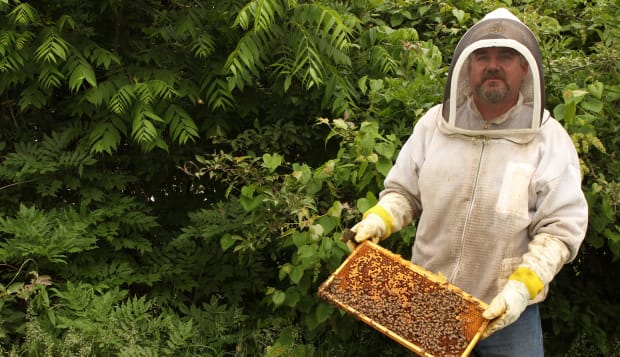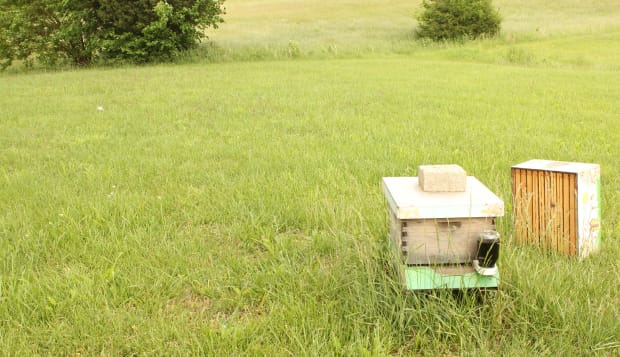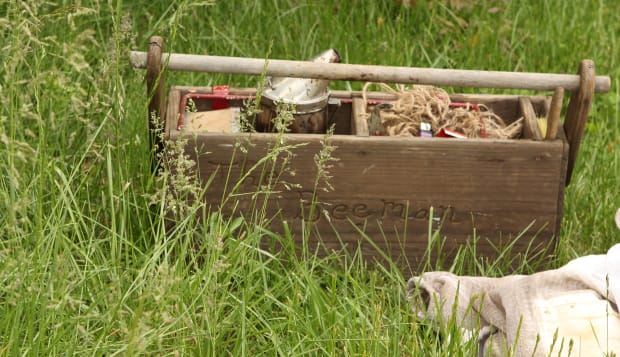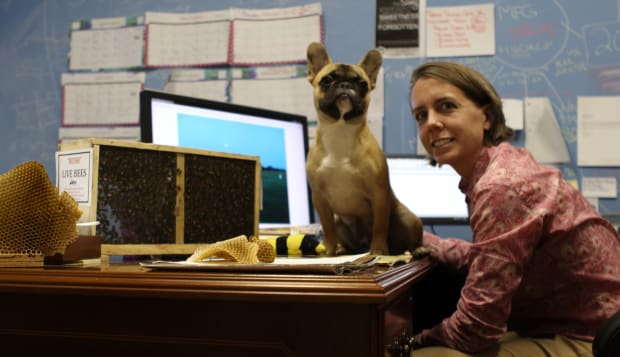Follow Dr. Kathy as she enters her 7th through 11th years of beekeeping in rural MD.
Monday, June 16, 2014
Thursday, June 12, 2014
Dr. Richard Fell to Serve as Pollinator Health Advisor to NPMA (National Pest Management Association) 6-10-14
From National Pest Management News-June 10-14
http://www.npmapestworld.org/news/releases/PR_061014.cfm
http://www.npmapestworld.org/news/releases/PR_061014.cfm
Dr. Richard Fell to Serve as Pollinator Health Advisor
NPMA and the Professional Pest Management Alliance (PPMA) are pleased to announce Dr. Richard Fell has been retained to serve as the organizations' Pollinator Health Advisor. In this role, Dr. Fell will provide counsel on NPMA™s public policy work on pollinators and support public and media messaging on pollinators for PPMA. Dr. Fell is Professor Emeritus in the Department of Entomology at Virginia Tech. He received his BA from the University of Pennsylvania and his MS and PhD degrees from Cornell University. His research and teaching interests are in Apiculture and Insect Behavior. His recent research projects have involved the study of a honey bee pathogen, Nosema ceranae, the within colony distribution of the parasitic mite, Varroa destructor, the effects of pesticides and pesticide residues on honey bee health, and the pollination of cultivated crops. Dr. Fell has been also responsible for beekeeping extension programs in Virginia and has given over 300 presentations to beekeeper associations and taught over 150 apiculture short courses and workshops. In addition, he has over 70 scientific and technical publications. He has received several prestigious teaching awards, including the Distinguished Teaching Award from the Entomology Society of America. He is also the past Chair of the Virginia Tech Academy of Teaching Excellence.
Thursday, June 5, 2014
Gardening tips for honeybees
From:
http://wvpublic.org/post/want-help-west-virginia-honeybees-here-are-five-gardening-tips?nopop=1
Want to Help West Virginia Honeybees? Here Are Five Gardening Tips
By GLYNIS BOARD
Bill and Emilie Johnson in their Morgantown garden. When they moved in 10 years ago, there was no landscaping or garden. Things have changed. And the bees LOVE it.
Credit Glynis Board / WVPublic
While Honeybee Colony Collapse Disorder (CCD) is relatively uncommon in West Virginia, bees and pollinators are still threatened in the region and all across the country. About a third of all of our foods (and beverages) come from crops pollinated by these insects. There’s growing concern that pesticides and certain farming practices are at the heart of the crisis, so more and more gardeners are stepping up to support pollinators in their own yards and fields.
Emilie and Bill Johnson of Morgantown are Master Gardeners, meaning they’ve been trained and either volunteer or teach horticulture through a national Master Gardener program. They have become passionate, quite accidentally, about supporting pollinators. Here are five tips to help you do the same:
1. Pollinators come in many shapes and sizes.
What started as a desire to encourage more butterfly visits became an interest in encouraging visits from all sorts of pollinators including honey bees and native bees, dragonflies, mayflies, and even humming birds and bats.
“We love the beautiful garden, too," Bill said, "so it’s not just about gardening for insects. It’s about gardening for people as well!”
Bill also points out that a butterfly is only an adult butterfly for a small portion of its total lifespan, and many early incarnations of butterflies require very specific plants.
The Johnsons grow milkweed for Monarch Butterfly larvae, for example. Monarchs are the big black, orange, and white migratory butterflies in grave danger of disappearing because of loss of habitat and other factors.
Images from the garden.
Credit Glynis Board / WVPublic
2. Keep it wild—or as wild as you can handle.
In fact, the Johnsons grow a variety of milkweeds as well as other native and wild plants because, apparently, bugs love the native stuff.
“Find a part of your garden that you can let go wild, or as wild as you can stand it and put native plants in or plants that people might think of as weeds,” Bill said. He cautions others about introducing plants that might be (or become) invasive.
3. Don’t keep a lawn, keep a "clipped meadow."
While the Johnsons won’t claim coining the phrase, “clipped meadow,” it gets to the point. From about 20 feet away, you might be able to discern some clover or a dandy lion in the yard, maybe. Johnson shrugs when he says he’s given up a monoculture-grass lawn.
“Clover is a legume and legumes are the only plant family that I know of that actually fixes nitrogen out of the air and puts the nitrogen into the soil. So there’s a synergy between the clover and the grass. Why put chemical nitrogen on your lawn when you can have clover do the job,” Bill said.
The Johnsons admit that they aren’t organic gardeners. But they, like many, are worried about pesticide use. According to a recent study by Harvard’s School of Public Health, pesticides are at the heart of colony collapse disorder (CCD). And the Environmental Protection Agency indicates that there is data to implicate one of the most commonly used pesticides, called neonicotinoids. The agency reports that residues from the pesticide, “can accumulate in pollen and nectar of treated plants and may represent a potential exposure to pollinators.”
4. Pollinate your own food.
Thirty percent of our food effusively depends on honeybees alone. The value of their pollination services is often measured by farmers and economists in billions of dollars. And the Johnson’s have come to learn that they, too, can take advantage of this free service to grow their own apples, blueberries, raspberries, and lots of herbs, too. The Johnsons report that pollinators love herbs like thyme, lavender and basil.
5. Anyone can do it.
Emilie said, as more and more information is being circulated on the subject of pollinators and gardening, Farmers Markets are a good place to get educated. And you don’t need a green thumb to grow some pollinator-friendly foods and plants.
“Anybody can help,” she said. “Anybody can plant a few things. Everyone can get in on this. It’s a fun thing, especially for kids! Kids love bugs!”
From a community garden, to a box of herbs on your deck or in a window box, Emilie said, the pollinators will find you.
Snapshot from Bill and Emilie Johnson's garden.
National Pollinator Week is June 16th, 2014!
National Pollinator Week is June 16th, 2014!
Sign the Highway BEE Act, H.R. 4790 petition if you are an American Citizen!!!!!!!!!!!!!!!!
Go to:
http://pollinator.org/BEEAct.htm
Keepers Of Bees (And A Legacy) At Kentucky's Walter T. Kelley Company
from aol.com
http://jobs.aol.com/articles/2014/06/03/this-built-america-kentucky-walter-t-kelley/?icid=maing-grid7%7Cmaing11%7Cdl12%7Csec1_lnk3%26pLid%3D484617
Keepers Of Bees (And A Legacy) At Kentucky's Walter T. Kelley Company
Setting the standard for beekeeping equipment
by Elissa Yancey
Talk with beekeepers and they will describe a certain moment. Maybe it's the first time they see 10,000 bees in a swarm. Or the first time they pull a frame dripping with bees and honey from an active hive. Or when they first identify a queen bee.
In that moment, they are hooked. Forget scared or anxious, as most of us are around bees. They use words like "spiritual" and "peaceful" to describe their interactions with the bees -- and then they spend years trying to understand to them.
In rural Kentucky in the 1920s, Walter T. Kelley understood the power and promise of bees. As he worked his own hives, he began designing tools with fellow beekeepers in mind.
From 1924 to his death in 1986, the company he created, the Walter T. Kelley Co., was the name in beekeeping equipment. He made and sold hive boxes, frames, smokers and pure beeswax, used as natural foundation for each frame in a hive -- rolled into sheets on machines designed by Kelley himself -- that are coveted by beekeepers around the world.

But when he died, the childless Kelley left his company to the local hospital. It operated it in a trust that benefited the hospital for 20 years. As time passed, the business' manufacturing processes became outdated and Kelley's slipped from its leadership position.
In 2006, businessmen Joe Papalia and Alan Bernard saw potential in the once-great company and purchased it, immediately breathing fresh life into Kelley. They brought in a new operations manager who helped set the company on a different path. By 2013, when Jenny Everett saw an unusual ad for a CEO-president job in the Harvard Business Review, the company was on better footing but still struggling.
During a visit to the company's southern Kentucky headquarters, Everett saw a company that had yet to find its place in an increasingly digital world, where the likes of Amazon can ship anything in the blink of an eye.
But despite those challenges, the core of the company built by Kelley was still strong.
"What stood out with the Kelley Company more than anything else was the people," says Everett, a 34-year-old Vermont native with an MBA from Harvard. "I felt like coming here, I was coming home. I could feed my mind, body and spirit in the passion of both business and beekeeping."
After the visit, she landed the job and moved to Grayson, Kentucky.
Chapter 1: The Kelley Way
Bees have always made honey, but humans haven't always had the easiest time extracting the sweet liquid made from the pollen bees gather. Beekeeping requires a lot more than a box and bees.
What made Walter Kelley successful at this complicated practice was his passion for inventing new equipment -- or riffing on an old way to make something better.
One of Kelley's most innovative equipment inventions was a queen cage. He knew that introducing a new queen into a hive could be tricky. Sometimes bees already in the hive kill the intruder or just don't take to her.

So Kelley created a different type of cage to ease the transition. The palm-sized rectangular wooden box with a screen top fits a queen and five or so worker bees, as well as a dollop of sugary, fondant-like substance that plugs a hole at the end of the cage.
Worker bees inside and outside the cage eat away at the "candy," as Kelley called it, getting used to the smell of the new queen as they enjoy their snack. By the time they eat their way through to the queen, the worker bees know her smell and are more likely to welcome her into their midst.
Then there are the tools that are literally standard in the industry. The Kelley hive tool can open, clean and separate frames in the hives. The Kelley electric knife helps beekeepers extract honey with less mess.
Kenny Day, 72, remembers Kelley and his tinkering ways well, and like many other employees, carries on the inventive legacy. Last year, using metal from a scrap pile, he built a machine to cut and make grooves in the wooden bars that hold wax foundation for bees to build on inside their hives.
When a co-worker asked to see his plans for the complicated piece of equipment, Day answered her seriously. "I told her, if I was smart enough to draw it out, I wouldn't be working here," he says, his face breaking into a huge grin.
After 45 years on the job, Day could live comfortably in retirement. But working at Kelley is more than a job to Day. As he puts it simply, "Without bees, you wouldn't have nothing."
Without bees, Kelley knew there wouldn't be a company. He also knew there would be no company without satisfied customers. So Kelley enacted one of his now-storied business practices--requiring all employees to know the company's catalog by heart. While this act of memorization might seem tedious, a Kelley customer never had to wait on the phone while a representative flipped through the catalog, stumped by a question. Learning the pieces meant learning the business.
Sondra Wilson, 45, could recite the entire catalog before she could even read. She helped her mother, Maxine Edwards, study for Kelley's daily quizzes. Wilson was just three years old when her mother started working at the company in the 1970s.
When Wilson went looking for a job 20 years later, the first place she thought of was Kelley's. Nervous and not wanting to cause a stir, she made a late-night call to a hiring manager before even telling her mother or husband about her intentions. When asked where she wanted to work, her reply was simple: "Any place Mom isn't," she recalls.
Now the two, along with Wilson's daughter Jessica Lowe, 26, all work at the company and live within a mile of each other--not far from Kelley's headquarters.
"This company has been a part of my life, my entire life," Wilson says.
Wilson's dedication to detail--she's categorized every bolt, nut and screw on the property--extends to her determination to pass along the Kelley values.
"From the newest person to the oldest person, I want them to know as much as I know about this company," she says. She carries on Walter Kelley's tradition of quizzing employees, especially the new ones. "I may be a little tough on people, but it's just 'cause I want them to care."
Chapter Two: The Bees Are Always Right
Most longtime employees can remember Kelley in his beekeeping helmet and mask, checking the hives in front of the main office building. During these inspections, employees watched nervously from inside.
But they weren't worried about him getting stung. They fretted over what he would find that needed improving, and more importantly, how they were going to fix it.

Literally everything the company makes is devoted to saving and supporting bees--and, of course, taking honey from them.
That attention to bees was important in Walter Kelley's time. Today it's critical to keeping bee populations alive. Colony Collapse Disorder, in which worker bees simply disappear from hives, has slashed bee populations by 50 percent in some cases in the past decade.
That's a staggering figure considering that bees pollinate an estimated $200 billion worth of crops every year, according to the United Nations.
"Beekeeping is the most important agricultural link in our food supply today," Everett says. "Without bees, one out of every three mouthfuls that you eat would disappear."
While many Kelley employees keep their own hives at home, and each department looks after an onsite bee colony, nobody has a closer relationship with them than resident beekeeper Mike Currey.
Twelve years ago, Currey started working in the Kelley metal shop, and soon became a bee convert. Now he keeps 28 hives at home and two at Kelley's 20-acre facility. That helps him show customers how to handle hives and check on the health of bees.
As he stacks and sorts crates filled with buzzing bees into groups on the expansive warehouse's floor for shipment, he grabs one and holds the wire mesh opening up for closer examination. "I love working with bees," he says. "You never quit learning from them."
He can tell by watching the ways bees fly in and out of a hive if they are doing well or are in trouble. He can pull out a hive bar, see what patterns the workers are making and determine the viability of the queen. "I'm no expert and I don't claim to be, but they are cool to work with," he says.
Chapter Three: Hives and Nesting Boxes
Nobody was quite sure what a Northerner was going to do with a rural Kentucky company when Jenny Everett arrived for her first day on the job. She had the right business background, but bringing a company with such a strong ties to its founder into the 21st century was going to take finesse.
What surprised her the most, Everett says, was how welcomed she felt, right from the start. "I thought people would keep me at a distance," she says. Instead her employees, who are also neighbors, started inviting her over for dinner. Since her husband works in Washington, D.C., and is away from home most nights, she accepted. She's often accompanied by Mojo, her French Bulldog, who has become something of a company mascot.

During Everett's first months at Kelley's, she figured that the only way to understand beekeeping--and the company--was to "roll up your sleeves and jump in."
She started by improving the company's production systems across buildings, adding checks and balances to make sure orders were accurate and increasing efficiency to supply a new generation of beekeepers with more tools, faster and at a competitive cost.
The catalog that Wilson knew by heart? A team created an all-new one that features beautiful photography and plenty of references to the company's new website. That's designed to make it easier for customers to order products, but also provide them with beekeeping resources, no matter their level of experience.
Unlike some new CEOs who look to cut costs by first laying people off, Everett chose to invest in her employees. She expanded into new businesses so there wouldn't have to be the traditional layoffs in the offseason.
Taking an innovative cue from Walter Kelley, she came up with the idea of building nesting boxes for chickens that are small enough for backyards, and can be built on the same equipment as hive boxes.
"Twenty-five percent of our beekeepers are also keeping chickens," says Everett, who has three of her own--Dixie, Trixie and Pixie--as well as five turkeys who roam the company's headquarters. "I firmly believe that we need to be the supplier of choice for all farm-oriented hobbies."
Beekeeping and raising chickens used to be something only farmers did. Now there are hives and coops popping up across the country--from rooftop gardens in Brooklyn to backyards in Berkeley, Calif.--as more people take on the task of growing and creating their own food.
Everett is capitalizing on that cultural shift, and in turn, the company is growing again. Sales topped $10 million this spring, and Everett expects that to increase by 50 percent this year. One big reason for that growth is the company's expansion into the retail market. By the end of summer, Kelley products will be in 1,000 stores, up from 100 at the beginning of the year. Traditional farm supply retailers like Rural King can't keep enough supplies in stock.
Kelley's significant growth means the company is hiring--and that's big news in a rural community. At a company lunch in late May, just after her one-year anniversary, Everett announced a job fair to hire 30 more employees--a 25 percent increase in employment.
Even the most veteran of Kelley employees senses something different in the air these days, and it's not just the chickens in the yard. Like generations before them, they plan to send in friends and neighbors, as well as family members, to apply for jobs. Only now those jobs are to fill three shifts of operations and fulfill orders for chicken nesting boxes, as well as hives.
"In business, any of your competitors can copy price, any of your competitors can copy quality by buying more machinery," Everett says. "But you can't copy people."
The Highway BEEAct H.R. 4790- sign the petition by June 16th, 2014 if you are a US Citizen!
Go to:
http://pollinator.org/BEEAct.htm
Support Highways Bettering the Economy and Environment Act
(Highways BEE Act)
http://pollinator.org/BEEAct.htm
Support Highways Bettering the Economy and Environment Act
(Highways BEE Act)

About this petition
Highways BEE Act: H.R. 4790 was introduced by Reps Alcee Hastings (D-FL) and Jeff Denham (R-CA) on May 30 and is strongly supported by the Pollinator Partnership (P2). Hastings and Denham are co-chairs of theCongressional Pollinator Protection Caucus (CP2C).Who Can Sign:
************************************
GROUP LETTER IN SUPPORT OF HIGHWAYS BEE ACTThe undersigned support H.R. 4790, the Highways Bettering the Economy and Environment Pollinator Protection Act (Highways BEE Act). Pollinators, such as honey bees and native pollinators, birds, bats, and butterflies, are essential to healthy ecosystems and are vital partners in American agriculture. Honey bees, monarch butterflies and other native pollinators are suffering drastic population losses, due in part to loss of habitat. Highway right-of-ways (ROWs) managed by State Departments of Transportation (State DOTs) represent about 17 million acres of opportunity where significant economic and conservation/environmental benefits can be achieved through integrated vegetation management (IVM) practices, that can—
The Highways BEE Act directs the Secretary of Transportation to useexisting authorities, programs and funding to encourage and facilitate IVM and pollinator habitat efforts by willing State DOTs and other transportation ROWs managers, building on innovative IVM efforts in a growing number of State DOTs.
************************************
Background:
| Highways BEE Act P2 Summary |
Monday, June 2, 2014
Blue honey? French beekeepers upset.
So the question for me is...does it melt in your mouth or your hands???? editorial remark-Dr. kathy
From time
BIZARRE
French Bees Produce Blue Honey

French apiarist Andre Frieh holds a sample of normal honey (right) besides a blue colored one (left) at his home in Ribeauville near Colmar, Eastern France, October 5, 2012.
Mars Incorporated has proclaimed that “Chocolate is better in color” with its M&Ms. But French beekeepers may beg to differ on that.
Since August, beekeepers near the town of Ribeauville, in the northeastern region of Alsace, have been reporting their bees are producing blue and green honey, according to Reuters. And they’ve traced the cause back to a biogas plant that processes waste from an M&Ms factory.
(PHOTOS: Bee Beard Contest in China)
Bees are apparently picking up vibrantly colored, sugary waste from the plant, operated by the company Agrivalor some 2.5 miles away from their apiaries. A statement from Agrivalor that appeared in the French newspaperLe Monde said the company would clean its containers and store waste in airtight containers to prevent bees from reaching it.
“We quickly put in place a procedure to stop it,” Philippe Meinrad, co-manager of Agrivalor, told Reuters.
France generates 18,330 tons of honey per year, making it one of the largest honey producers in the European Union. In Alsace alone, about 2,400 beekeepers manage 35,000 colonies, which produce about 1,000 tons of the stuff per year. However, France hasn’t been spared by the largely unexplained decrease in the world bee population in recent years, Reuters reported.
Gill Maclean, a spokesperson for the British Beekeepers’ Association, told theBBC that the harsh winter of 2011-2012 may have affected bees’ ability to forage. This could be a reason why the bees sought out the alternate sugar.
“Bees are clever enough to know where the best sources of sugar are, if there are no others available,” Maclean told the BBC.
Rest assured: Consumers won’t see blue honey on store shelves anytime soon. Alain Frieh, president of the apiculturists’ union, told Reuters the only similarity between regular honey and their bees’ M&M-tainted byproducts might be taste.
“For me, it’s not honey,” Frieh told Reuters. “It’s not sellable.”
Subscribe to:
Comments (Atom)


